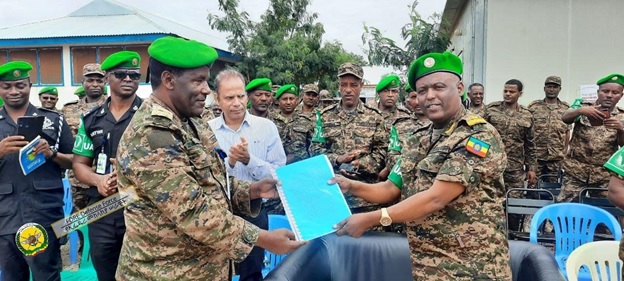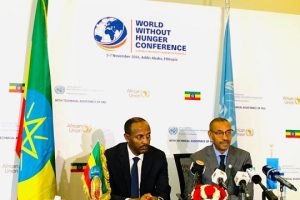
BY YOHANES JEMANEH
Contemporary world history tells that Ethiopia is among the leading countries that have been striving for enduring peace of the global population. Various regional, continental and global peacekeeping missions are notable testimonies of this fact.
Ethiopia can be known as a peace-desiring nation for coordinating various countries to this end with due respect of their sovereign rights. In recent years, Ethiopia deployed its national army under the African Union Mission to Somalia (AMISOM) in order to fight terrorism in Somalia. This effort tended to avert terrorists’ ambition of affecting peace and destabilizing countries in the region as well as in the continent.
In this regard, Ethiopia conducts military diplomacy and has signed various security agreements with most of the countries located in the eastern African region. Countries like Djibouti, Kenya, Somalia, Sudan, South Sudan, and Burundi among others have peace and security cooperation with Ethiopia.
As any world country that carries out military diplomacy aimed at averting security problems afar, Ethiopia works in the area represented by its defense staff and civil authorities in line with its foreign policy. Even in the past few weeks, chiefs of the national army discussed mutual concerns with their counterparts in Somalia and Somaliland. These efforts have enabled the nation to play its decisive role in preventing violence and terrorism, especially in the fight against Al-Shabaab.
Briefing the media on the latest developments on 6 August 2022, State Minister of the Government Communications Service Selamawit Kassa said that the country has achieved remarkable results in fostering military diplomacy with neighboring countries in terms of ensuring peace and security in the region. For Selamawit, the military diplomacy gain has enabled the nation to undertake successful military action against the Al-Shabab militants.
It is to be recalled that the Ethiopian National Defense Forces (ENDF) jointly with the Somali Region Special Force has taken military action against Al-Shabab militants who tried to encroach the territory of Ethiopia. In this regard, the fruit of the military diplomacy has been clearly demonstrated in this operation when the government of Somalia blocked its door to the retreating militants of the terrorist group. And so Somalia supported the operation taken by Ethiopia, Selamawit said, attributing such actions to the flourishing military diplomacy with neighboring nations.
In relation to this, the Ministry of Defense announced that it has foiled the conspiracy of Al-Shabaab targeting Ethiopia. ENDF Head of Army Deployment Unit and Acting Coordinator of the Tentative Command post in Somali Regional State Major General Tesfaye Ayalew said that the joint forces of ENDF and Somali Regional state special force annihilated the terrorist group that attempted to attack Ethiopia from three fronts.
The joint force has explored and captured the weapons and other military luggage hidden at Elkere, Somali Regional state, by Al-Shabaab for terrorism. The national army is currently chasing and capturing remnants of the terrorist group. The group attempted an attack on Ethiopia induced by a wrong conjecture that the country is languishing in internal difficulties. Major General Tesfaye noted that the securities should go on standby for any other attempt of attack refraining from any self-absorption on the shining victory achieved over the terrorist group.
In related news, the ENDF is annihilating terrorists in the Oromia region that the Al-Shabaab has been trying to coordinate with for its terrorism ambition. Accordingly, some 333 militants of the terrorist Shene have been destroyed and other 671 individuals are arrested and under investigation in connection with complicity with the outlawed group.
These days the country is absorbed in strengthening its military diplomacy, security system, and military power side by side with its development efforts. Human resource capacity building, installation of advanced military equipment and technology, institutionalization, and consolidation of military cooperation with other countries are some of the works being conducted under the Ministry of Defense during the reform period.
The Ethiopian Air Force, for instance, has been reorganized and become independent of any political and ethnic affiliations after the reform, Air Force Chief Lieutenant General Yilma Merdassa said recently. Hence, it is modernizing and enhancing its capacity based on the merits and competencies of professionals.
National Defense Force Chief of Staff Field Marshal Beranu Jula said that the country is building a huge military that is scared by enemies. The Ethiopian Air Force has been rebuilt in a way that it can defend the sovereignty and dignity of the country.
Field Marshal Berhanu pointed out that significant improvement has been made in infrastructure and human resources development. The government is also working to make the air force to become the first in Africa by maintaining existing aircraft, purchasing up to date aircraft, planes and helicopters, and training pilots. Ethiopia’s army is not only built to ensure peace in the country but also to regional security. The success of Ethiopian peacekeeping army deployed in Somalia is a current testimony of this effort.
While on the subject of this mission, the African Union Transition Mission in Somalia (ATMIS), a multidimensional mission (military, police and civilian), authorized by the African Union and mandated by the United Nations Security Council has replaced AMISOM as of April 2022.
Accordingly, the Ministry of Defense announced yesterday that the 6th Round Ethiopian Peacekeeping Army that had been fighting terrorism in South Western Somalia under AMISOM was replaced by new Ethiopian troops after the reconfiguration of AMISOM as ATMIS.
AMISOM Sector Three Army Commander in Chief Brigadier General Zewdu Setargie said during the handing over ceremony of the peacekeeping mission that the sector has played its due role of ensuring the security of the Somali people. He mentioned the recently held peaceful election of Somalia as an example of the success of the mission.
The succeeding ATMIS Sector Three Army Chief Brigadier General Besfat Fentie pledged that his Command will capably accomplish ATMIS’s mission and consolidate the successes achieved by the predecessor under AMISOM.
Ethiopia has been the long-time peace ally of Somalia and this alliance shall consolidate for the common interests of the two nations in ensuring security and economic growth. It is this ambition that was reflected when Deputy Prime Minister and Foreign Affairs Minister Demeke Mekonen discussed with Balal Mohamed Osman, Acting Minister of Foreign Affairs and International Cooperation of Somalia in July 2022.
In their discussion, Demeke stressed that the two countries should step up their efforts, particularly in the fight against terrorism, while noting the various areas in which the governments of the two countries should cooperate.
The acting foreign minister of Somalia, Balal Mohamed Osman, on his part, stated that the country’s new administration has given peace the topmost priority and that it would continue to cooperate with Ethiopia in this regard. The minister pointed out that the partnership of the two countries should be strengthened in the efforts to destroy the Al-Shabaab terrorist group.
Not only Somalia, Ethiopia is also reaffirming its commitment to cooperate with various countries in ensuring bilateral and regional security. Djibouti, Kenya, South Sudan, Burundi are some of the nations in which Ethiopia renewed its commitment in 2022 to work together in the area of military diplomacy.
Ethiopia and Djibouti had inked an agreement in March, 2022, to work together on border security, peacekeeping and other areas. The pact was signed at the end of the 9th Ethio-Djibouti Defense Chiefs of Staff meeting held at the Ethiopian National Defense Force (ENDF) Headquarters in Addis Ababa.
ENDF Chief of Staff Field Marshal Birhanu Jula and his Djiboutian counterpart General Zakaria Cheikh Ibrahim signed the agreement that aims to scale up cooperation between the defenses forces of the two countries. Accordingly, the two sides agreed to jointly work on border patrols, step up information exchange, counter-terrorism and peacekeeping operations.
The agreement signed for strategic, technical cooperation between the two nations will pave the way for regional peace and security. The two countries will be at the forefront to consolidate their role in peacekeeping missions, Field Marshal Birhanu said.
On March, 2022, the ENDF and its South Sudanese counterpart agreed to share experience in logistics, and capacity-building and cooperate in border security issues. This was learned when Deputy Chief of ENDF L. General Abebaw Tadesse met with South Sudanese counterpart, Lt.Gen.Thoi Chany Reath.
Ethiopia has also agreed to collaborate with Burundi in military spheres, according to the Government Communication Service. This was unveiled by Government Communication Service Minister Legesse Tulu following the February 2022 talks between Prime Minister Abiy Ahmed and President Evariste Ndayishimiye of Burundi.
The information obtained from the Ethiopian Embassy in Kenya indicated that Ethiopia and Kenya also renewed an agreement to strengthen their cooperation in the military spheres. The Chief of Staff of the ENDF Field Marshal Berhanu Jula and the Kenyan Chief of the Defense Forces General Robert Kariuki Kibochi held talks in Nairobi on 30 March during which the two agreed to take lead to strengthen the East Africa Standby Force (EASF) and work together for mutual peace and security.
During the discussion, the two chiefs of staff also agreed to work together on various bilateral and regional peace and security issues. There is a favorable circumstance and opportunity for Ethiopia and Kenya to work together in areas of peace and security as well as training, according to Field Marshal Berhanu.
Both Ethiopia and Kenya are part of ESAF, a regional organization mandated to “enhance peace and security in the Eastern Africa region” and is one of the five regional multidimensional Forces of the African Standby Force (ASF) consisting of Military, Police and Civilian components. Among others, ASF can provide rapid deployment of forces to carry out preventive deployment, rapid intervention, peace support or stability operations and peace enforcement.
To wrap up, if Ethiopia wants to prevail over the fruits of its military diplomacy in creating a peaceful region, it needs to add more efforts in order to implement peace and security agreements. It is this way the country would capably avert cross-border crimes, mainly the terrorist attacks inflicted by Al-Shabaab and other organizations of similar kind.
The Ethiopian Herald August 16/2022




